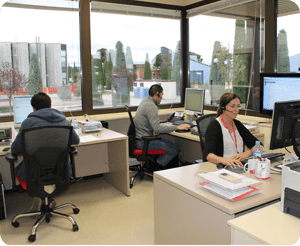Castilla y León extends GMV’s Transport-on-Demand contract up to 2018

Castilla y León’s Regional Ministry of Public Works and the Environment (Consejería de Fomento y Medio Ambiente) has decided to extend GMV’s contract for management and maintenance of Castilla y León’s transport-on-demand contract up to March 2018. The region originally awarded the contract to GMV back in 2004.
In 2004 the Consejería de Fomento y Medio Ambiente came to the conclusion that a traditional public transport service, with fixed schedules and set routes, was not much good for rural areas with a scattered population and low demand. It would be very unlikely to be a profitable concern. A new, cost-effective type of transport was needed for such areas, offering wider territorial coverage and “tailor-made” services to ensure that people living in these areas can move about with the same freedom as populations in built-up areas. This is where GMV’s transport-on-demand system comes into its own, offering the ideal flexibility to meet the public-transport needs of these areas.
Castilla y León’s transport-on-demand system, initially given a trial run in a pilot scheme in Barco de Ávila, is a trailblazing system within Europe, enabling towns and villages to be connected à la carte. Users only have to make a request and the buses then plan their routes to pick them up, stopping only where requests have been made.
GMV’s solution comprises a Transport Management Center where all transport requests are received by phone or website, in planned mode or real time, the service then automatically being planned to suit. Transport operators are informed of the requests, after which the transport arrangement is then monitored online and users are kept abreast of any service incidents on information panels set up at various points along the route.
The system also includes a real-time technological platform, including onboard equipment with GPS receivers and GPRS modems on the vehicles, interactive information panels in the various localities telling users how long the vehicle will take to arrive and informing them of any incidents, delays, etc. It is rounded out by a web booking facility.
A crucial part of the project is direct communication between the end users of the transport-on-demand system and the service provider through a booking center (housed on GMV’s Boecillo site). Would-be passengers only have to call in by phone and the buses then plan their routes to pick them up on the way.
A new feature phased in in 2013 was joint management of scheduled passenger services with special school-bus services. This new service covers 269 routes and benefits about 100 different localities.
By 2016 the groundbreaking public-transport management system has proved more than capable of meeting the real and complex transport needs of a huge, scattered region while making the best possible use of resources. Castilla y León’s transport-on-demand service now includes 810 routes catering for over one million inhabitants of 3557 towns and villages throughout the region of Castilla y León. Since being set up it has clocked up a ridership of 3 million and given a service to over 105 zones of the region.
Within Europe GMV has also set up a similar system in Portugal, further endorsing the viability and profitability of this public-transport arrangement in a rural environment.